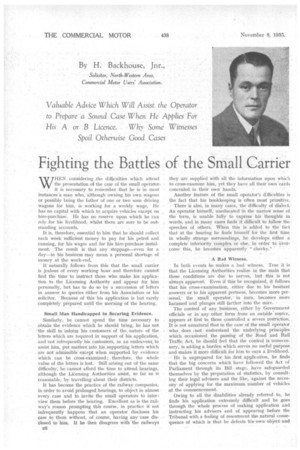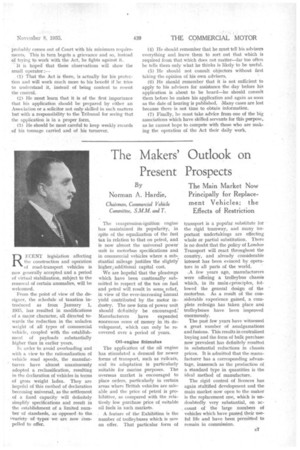Fighting the Battles of the Small Carrier
Page 128

Page 129

If you've noticed an error in this article please click here to report it so we can fix it.
Valuable Advice Which Will Assist the Operator to Prepare a Sound Case When He Applies For His .A or B Licence. Why Some Witnesses Spoil Otherwise Good Cases
By H. Backhouse, Jnr.,
Solicitor, North-Western Area, commercial Motor Users' Association.
WHEN considering the dif4cu1ties which attend the presentation ol the case of the small operator,
. it is necessary to remember. that he is in most instances a man who, although owning his own wagons or possibly being the father of one or two sons driving wagons for him, is working for a weekly wage. He has no capital with which to acquire vehicles except on hire-purchase. He has no reserve upon which he can rely for his liyelihood, whilst there are sure to be outstanding accounts.
It is, therefore, essential to him that he should collect each week sufficient money to pay for his petrol and running, for his wages and for his hire-purchase instalment. The result is that any stoppage—even for a day—in his business may mean a personal shortage of money at the week-end.
' It naturally follows from this that the small carrier is jealous of every working hour and therefore cannot find the time to instruct those who make his application, to the Licensing Authority, and appear for, him personally, but has to do so by a succession of letters in answer to queries either from his Association or his solicitor. Because of this his application is but rarely completely prepared until the morning of the hearing.
Small Man Handicapped in Securing Evidence.
Similarly, he cannot spend the time necessary to obtain the evidence which he should bring, he has not ' the skill to inform his customersof the, nature of the letters which are required in support of his application, and not" infrequently his _customers, in an endeavour_ to' assist him, put mattersinto his supporting letters which are not admissible' except when _supported by evidence which can be cross-examined; . therefore, the whole value of the letters is lost. Still arising out of the same diffieulty, he cannot afford the time to attend hearings, although' the Lieensing • Authorities assist, so far as is reasonable, by travelling about their districts.
It has become the practice of the railway companies, in order to avoid prolonged hearings, to object in almost every case and to invite the small operators to interview them before the hearing. Excellent as is the railway's reason prompting this course, in practice it not infrequently happens that an operator discloses his case to them' without, of course, having any case disclosed to 'him. If he then disagrees with the railways they are supplied with all the information upon which to cross-examine him, yet they have all their 'own 'cards concealed in 'their own hands.
Another feature of the small operator's difficulties is the fact that his bookkeeping is often most primitive.
• There is also, in many cases, the difficulty of dialect.. An operator himself, uneducated in the narrow sense Of the term, is unable fully to express his thoughts' in words, and in .many cases finds it difficult. to follow the speeches of others. When this is added to the 'fact that at the hearing he finds himself for the first tithe in wholly strange surroundings, .he develops. either .a complete inferiority, complex Or else, in order to O'ver
corm this, he becomes apparently " Cheeky." •• • A Bad Witness.
In both events he makes a bad witness. True it is that the Licensing Authorities realize in the main that these conditions are due to nerves, but this is not always apparent. Even if this be recognized, it follows that his cross-examination, either due to his hesitant answers or to his apparent pertness, becomes more per-. .sonal,the small operator, in turn, becomes more harassed 'and plunges still farther into the mire.
The control of any business, either by Government officials or in any other form from an outside' source, appears at first to those controlled a severe_ restriction.. It is not unnatural that in the case of the small operator: who does 'not understand the underlying principles which occasioned the passing of the Road arid Rail Traffic Act, he should feel that the control is unnecessary, is adding a burden which serves no useful purpose and makes it more difficult for him to earn a livelihood.
• . He is unprepared for his first application, he finds . that the big concerns which have followed the Act of Parliament through its Bill stage, have safeguarded themselves by the preparation of statistics, by consult-. ing their legal advisers and the like, against the necessity of applying for the maximum number of vehicles at the commencement.
Owing to all the disabilities already referred to, he finds his application extremely difficult and he goes through the whole process of making application and instructing his advisers and of appearing before the Tribunal with a feeling of resentment the natural consequence of which is that he defeats his own object and probably comes out of Court with his minimum requirements. This in turn begets a grievance and so, instead Of trying to work with the Act, he fights against it.
It is hoped: that these observations will show the small operator :
(1) That the Act is there, is actually for his protection and will work much more to his benefit if he tries to understand it, instead of being content to resent the control.
(2) He must learn that it is of the first importance that his application should be prepared by either an Association or a solicitor not only skilled in such matters but with a responsibility to the Tribunal for seeing that the application is in a proper form.
(3) He should be most careful to keep weekly records of his tonnage carried and of his turnover. (4) He should remember that he must tell his advisers everything and. leave them to sort out that which is required from that which does not matter—far too often he tells them only what he thinks is likely to be useful.
(5) He should not consult objectors without first taking the opinion of his own advisers.
(6) He should remember that it is not sufficient to apply to his advisers for assistance the day before his application is about to be heard—he should consult them before he makes his application and again as soon as the date of hearing is published. Many cases are lost because there is not time to obtain information.
(7) Finally, he must take advice from one of the big associations which have skilled servants for this purpose, as he cannot hope to compete with those who are making the operation of the Act their daily work.












































































































































































































































































































